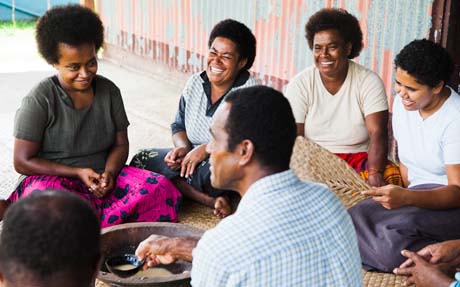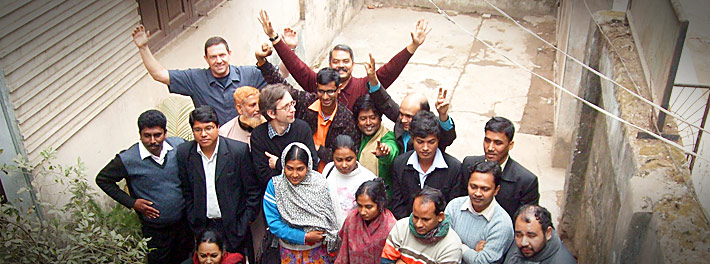Bridging Communities in Development with Kerry Thompson and the Disability Rights Fund
In development, we come across a wide array of practicioners--some work in gender and development, others in environment and sustainability and among others some in healthcare and public health. But what about disability and human rights?
The Disability Rights Fund (DRF) is a leading organization supporting human rights and persons with disabilities at both local and national levels. Located in Boston, Massachusetts, the Disability Rights Fund assists developing countries through modest grants, supporting the advancement of disability rights all over the globe. DRF has funded organizations in Africa, Asia, Latin America, the Middle East, Pacific Islands, and Eastern Europe. Without the support of these grants, organizations working within the disabilities framework are not able to advance their efforts in human rights or disabilities.

The Disability Rights Fund, with its sister fund, Disability Rights Advocacy Fund - has expanded their work to 28 countries across 6 regions of the world, granting $13 million for rights advancement through supporting disability organizations in the developing world.
This week, we had the opportunity to speak with Kerry Thompson, Information and Program Coordinator of the Disability Rights Fund. Thompson versed us a little more on her work at DRF as well as her personal experience in working with disabilities in international development. Her thoughts on inclusivity and accessibility inform us of new goals international organizations can be meeting.
Thompson first got involved in the Disability Rights Fund, after she took a course at the Harvard Kennedy School discussing the UN Convention on the Rights of the Child. Her class made her realize, that disabilities was a human rights issue. This made her think about her life growing up with disabilities. Soon after, the Disability Rights Fund was looking to ground their work, and hired Thompson as their first hire for Program Associate. Today, she works at the Disability Rights Fund having various roles-social media, supervision of team translators, making the website accessible in other languages, as well as supporting the Executive Director, DRF Board and Global Advisory Panel.
According to Thompson, the Disability Rights Fund does more than just supply grants to DPOs (Disabled Persons Organizations). Often times, DRF is invited to speak at conferences or panels for webinars. In addition, DRF tries to gather resources for organizations that is meant to be shared with grantees as well as a larger audience. These resources can be found on the DRF page and include tips on exercising inclusivity (Inclusion of Deaf People), Organizing Workshops, and Awareness Raising. Thompson mentioned one of the things that separates DRF from other organizations is their willingness to help people with disabilities write good proposals rather than simply just rejecting grants which is another way DRF supports their applicants.
One of the questions we asked Thompson was also how accessible she finds international development to be here in Boston and in general. According to Thompson, “international development could definitely be more accessible and inclusive than it currently is.” Kerry says there is a small, but growing number of people with disabilities traveling and working in other countries, but many people with disabilities remain poor and are unable to gain that initial experience abroad.
“No matter where in the world you are – disabilities and poverty are connected,” she said.
While there may be a growing number of people with disabilities getting a college degree, much like Thompson who has a Bachelor’s Degree from Louisiana State University and a graduate degree from Harvard’s Graduate School of Education, there are still a wide array of employers who hold discriminatory hiring practices or lack reasonable accommodations for people with disabilities. Thompson, believes due to these reasons, people with disabilities are unable to get jobs or work in the development field, or even worse, due to a lack of income, be unable to receive good healthcare or nutrition.
So if various fields are discriminating against people with disabilities, we asked Thompson, how she thinks international development can be more accessible to these communities.
“It's fact - based, the majority of people who have disabilities living in the developing world are poor or living on less than a dollar a day. I believe the number is around 80%. That stems from a lack of access to education, which could lead to meaningful employment….I think international development recruiting should actively try to seek people with disabilities to be part of their initiatives or to work with them to arrange for the accommodations they need in order to be part of international development.”

Disability Rights Fund, most certainly follows this initiative. Along with their mission, DRF utilizes the UN Convention on the Rights of Persons with Disabilities (CRPD) as a foundation to their work to “ensure people with disabilities are front and center,” says Thompson.
Kerry’s advice to new practicioners in the development field is to “be as broad as possible in your learning experience. If your interest is in women's rights, learn about the indigenous community or youth community because this will enable you to work on bridging communities, which really is the root of international relations, bridging communities.”
Kerry Thompson is the Information and Program Coordinator of the Disability Rights Fund. She is a graduate of both Louisiana State University and Harvard University. Thompson has previously worked at Brigham and Women’s Hospital and has co-founded a communication tool for the deaf and hard of hearing called Text 4 Deaf. In addition she also has founded a program called Silent Rhythms, a tool for teaching the disability community dance.
